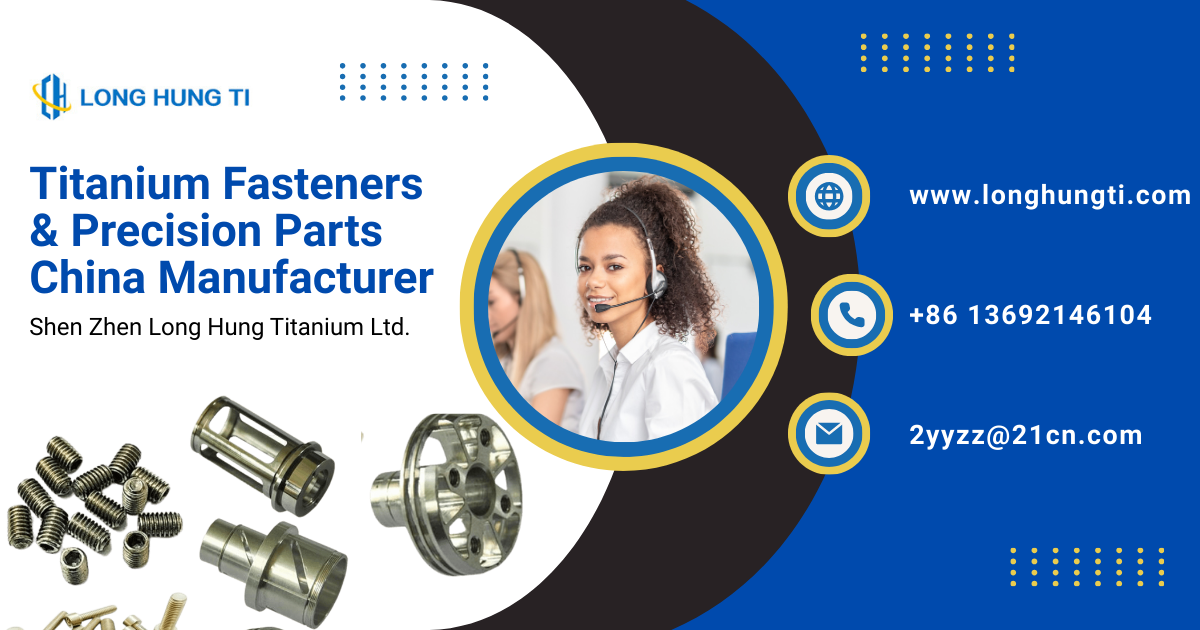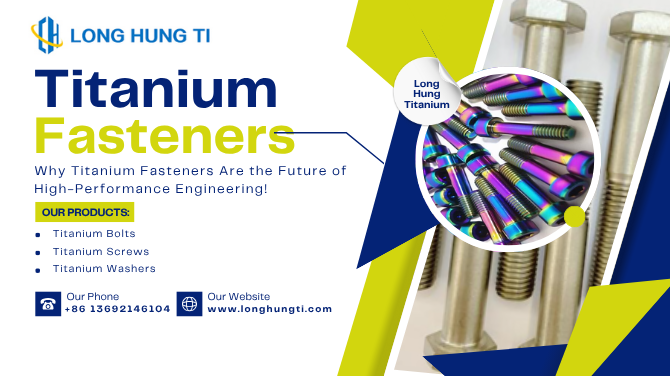When it comes to engineering at the highest levels, every component counts—especially fasteners. These seemingly small pieces are the unsung heroes that hold complex machinery together under incredible stress, heat, and pressure. As industries push the boundaries of performance, durability, and efficiency, the demand for materials that can keep up has skyrocketed. This is precisely where Titanium Fasteners shine.
Titanium fasteners have rapidly become the go-to choice for engineers and manufacturers who require lightweight, strong, and corrosion-resistant solutions that won’t fail when it matters most. From aerospace and automotive sectors to marine and medical applications, the unique properties of titanium offer unmatched benefits that traditional fasteners simply can’t deliver.
At Shen Zhen Long Hung Titanium Ltd., we specialize in precision-engineered titanium fasteners designed to meet the rigorous demands of today’s high-performance engineering challenges.
The Rise of Titanium in Fastening Technology
Why Traditional Fasteners Fall Short?
For decades, steel and stainless steel fasteners have been the backbone of machinery assembly. However, these materials have notable limitations—corrosion, weight, and vulnerability to extreme conditions. In high-stress environments, these shortcomings translate into maintenance issues, frequent replacements, and potential failures.
Titanium: The Game-Changing Material
Titanium is uniquely positioned to overcome these challenges. Its combination of low density, exceptional strength, and superior corrosion resistance makes it ideal for fasteners that need to perform under extreme conditions. But what exactly makes titanium so special?
Core Properties of Titanium Fasteners
- Unmatched Strength-to-Weight Ratio
Titanium fasteners are about 45% lighter than steel but offer comparable, if not superior, strength. This weight reduction can significantly improve the efficiency of vehicles and machinery, especially in aerospace and automotive industries.
- Exceptional Corrosion Resistance
Unlike steel, which rusts and degrades over time, titanium forms a stable oxide layer that protects it from corrosion, even in harsh environments like saltwater, chemicals, and extreme temperatures.
- High Temperature and Fatigue Resistance
Titanium fasteners maintain their strength at temperatures up to 600°C (over 1100°F), and they excel in resisting fatigue and mechanical stress, making them reliable for critical applications.
- Biocompatibility
In medical engineering, titanium’s non-toxic nature and compatibility with human tissue make it the material of choice for implants and surgical instruments.
Industries Revolutionized by Titanium Fasteners
- Aerospace and Aviation
Weight and durability are paramount in aerospace. Titanium fasteners help reduce aircraft weight, improving fuel efficiency while ensuring structural integrity under high stress.
- Automotive and Motorsport
High-performance vehicles benefit from titanium fasteners by achieving lighter weight and enduring extreme vibrations and temperatures in engines and suspensions.
- Marine and Offshore Applications
Titanium’s corrosion resistance makes it ideal for saltwater exposure, protecting fasteners from rust and degradation on ships, oil rigs, and underwater equipment.
- Medical Field
Titanium fasteners’ biocompatibility enables their use in surgical implants, dental devices, and medical tools, offering durability without risking adverse reactions.
- Renewable Energy
Wind turbines and solar panel mounts use titanium fasteners for their strength and longevity in outdoor, harsh environments.
Advantages of Using Titanium Fasteners
- Longevity and Durability
Due to corrosion resistance and fatigue strength, titanium fasteners last longer than traditional metal fasteners, reducing downtime and maintenance costs.
- Weight Reduction
In transport sectors, reducing weight translates to better fuel economy, enhanced speed, and overall improved performance.
- Reduced Maintenance Costs
Titanium’s resistance to wear and corrosion means fewer replacements and less frequent inspections, saving money over time.
- Environmental Impact
Titanium is recyclable and requires less frequent replacement, contributing to sustainable engineering practices.
Challenges and Solutions in Using Titanium Fasteners
- Higher Initial Cost
While titanium fasteners cost more upfront, their extended lifespan and performance benefits offset the initial investment.
- Machining and Installation
Titanium’s hardness can make machining and installation more challenging, but advanced manufacturing techniques and proper tools have largely mitigated these issues.
- Preventing Galling
Titanium fasteners can gall if used with certain materials. Using compatible nuts and lubrication can prevent this problem.
Manufacturing Excellence at Shen Zhen Long Hung Titanium Ltd.
- Precision Engineering
Using state-of-the-art CNC machines, we produce titanium fasteners with tight tolerances to ensure perfect fit and function.
- Quality Assurance
Every fastener undergoes rigorous testing, including tensile strength, corrosion resistance, and fatigue tests to meet global standards.
- Custom Solutions
We offer customized titanium fasteners tailored to specific industry needs and unique project requirements.
Titanium Fasteners vs. Traditional Fasteners
Steel and Stainless Steel
- Weight: Titanium is significantly lighter
- Strength: Comparable or superior
- Corrosion Resistance: Titanium far exceeds
Aluminum
- Strength: Titanium is much stronger
- Durability: Titanium lasts longer in harsh conditions
Coated Fasteners
- Durability: Titanium’s natural oxide layer provides permanent corrosion resistance, unlike coatings that can wear off.
- Advanced Titanium Alloys
Research is ongoing to develop alloys that offer even better strength and corrosion resistance.
- Smart Fasteners
Integrating sensors in titanium fasteners could allow real-time monitoring of stress and fatigue.
- Broader Industry Adoption
As costs decrease, more industries will adopt titanium fasteners for their benefits.
Titanium fasteners are more than just components—they’re a strategic advantage in high-performance engineering. Their unique properties make them ideal for industries that demand strength, durability, and reliability in extreme conditions. With manufacturers like Shen Zhen Long Hung Titanium Ltd. leading the way in precision and quality, titanium fasteners are truly the future of fastening technology.

FAQs
1. Are titanium fasteners compatible with all types of bolts and nuts?
They are best paired with compatible materials, such as titanium or specially coated components, to prevent galling.
2. How do titanium fasteners perform in extreme environments?
They excel due to their corrosion resistance, high temperature tolerance, and fatigue strength.
3. Can titanium fasteners be reused?
Yes, they maintain their integrity over multiple uses, unlike many traditional fasteners.
4. What industries benefit most from titanium fasteners?
Aerospace, automotive, marine, medical, and renewable energy sectors see the greatest advantages.
5. How does the cost of titanium fasteners compare to steel?
While more expensive upfront, their longevity and performance lead to cost savings over time.



